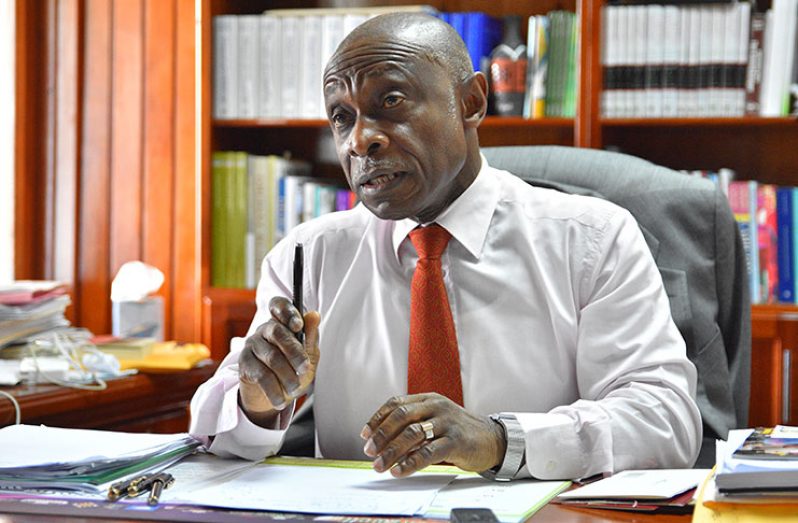…Greenidge laments shortage of specialist lawyers at ministry
AS the country eagerly awaits the decision of the United Nations Secretary-General António Guterres on whether the Guyana/Venezuela border controversy will be referred to the International Court of Justice (ICJ), the Foreign Affairs Ministry is working to boost its team of lawyers here as it continues with preparatory works ahead of the announcement.
In an exclusive interview with the Guyana Chronicle, Foreign Affairs Minister Carl Greenidge said for the purpose of “enhanced mediation” at the level of the United Nations, Guyana has retained the services of a U.S.-based law firm – Foley Hoag LLP. Foley Hoag was the same law firm that successfully spearheaded the case for the Government of Guyana in the maritime boundary dispute with Suriname. “The advantage of that is that they know the history and they are familiar with the issues,” Minister Greenidge posited, while noting that through the firm, lawyers have been providing Guyana with advice on “negotiations and pitfalls.”
He said once the matter is referred to the ICJ, the legal team will be expanded. “It is expected that once the process at the ICJ starts we will have to retain additional skills both for the formal presentation and also in terms of the preparation,” the Foreign Affairs Minister explained. The Government has set aside US$15M for legal fees.
Shortage of lawyers
However, internally the Foreign Affairs Ministry is faced with a shortage of lawyers. Minister Greenidge said while the ministry has an internal team which includes lawyers, the current quota is not sufficient. It was explained that the Foreign Affairs Ministry has four lawyers, and of them has not yet acquired the Legal Education Certificate (LEC). It was noted that one of the lawyers deals with matters relating to trade, while two of them deal with issues relating to the United Nations.
It was noted too that since 2014, under the People’s Progressive Party (PPP) administration the ministry had been trying to recruit the services of six additional lawyers. “We have been looking for lawyers in the ministry to work on this specific area and since we came into office, there have been, I believe, two rounds of advertisements and interviews, and in spite of that no one has been recruited,” Minister Greenidge said.
He said part of the problem has to do with the emoluments. It was explained that only a small number of lawyers responded to the notices, and applied. “When those who came and were told what was the offer they weren’t interested.” The Foreign Affairs Ministry has been working with Cabinet and the Public Service Ministry to have the problem resolved.
Minister Greenidge said it is critical for the ministry to have “comprehensive legal skills.”
“Instead of the Public Service Commission addressing the issue that we raised with them…. instead of the Public Service Ministry addressing this issue, we ended up with them sending us a whole set of people with no legal backgrounds whatsoever. It is astonishing, but that’s a fact,” Minister Greenidge said.
He emphasised that government has the responsibility to ensure that lawyers with the required skillsets are kept. “It isn’t that there are no lawyers in here, but the things that have to be done in the ministry are quite wide, and I think a lot of people don’t understand this, and therefore those who are in here are occupied doing other things which are critical to the work of the ministry, and not necessarily specialists in the area that we are looking at,” he explained.
Optimistic
That aside, Guyana is optimistic that the border controversy will be sent to the ICJ for a final ruling in keeping with the tenets of the 1966 Geneva Agreement. The former UN Secretary-General Ban Ki-moon and Mr. Guterres, in keeping with the 1966 Agreement, agreed to refer the Guyana/Venezuela border controversy to the ICJ if significant progress is not made in arriving at a full agreement for the settlement of the controversy at the level of the Good Offices process.
Venezuela is claiming that the 1899 Arbitral Tribunal Award, which had given more than 90 percent of an area to then British Guiana (now Guyana), is null and void. Approximately 118 years after that award was issued, the Guyana Government holds strongly to the view that a juridical course of action is the only means through which this matter can be permanently resolved. For more than two years, the government has been seeking to reach a peaceful resolution to the border controversy.



.jpg)









